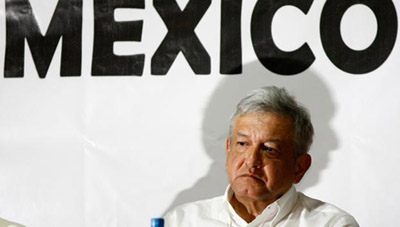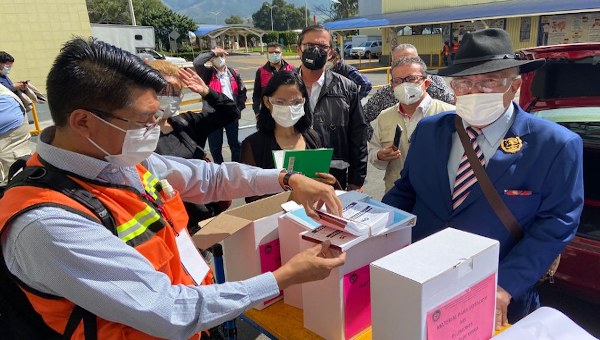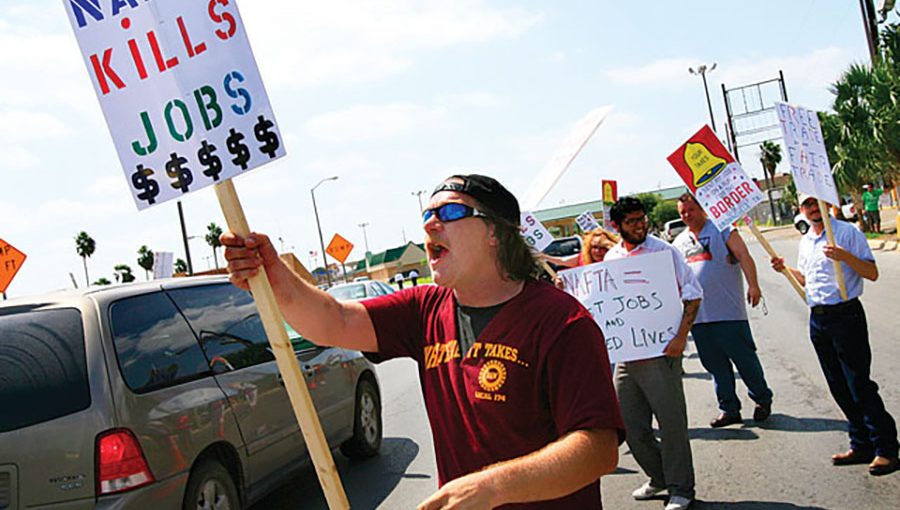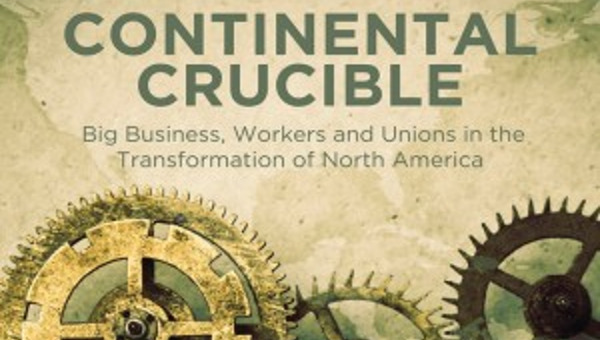Mexico: Why López Obrador?
Book Review: Arturo Ramos and Maria Teresa Lechuga, ¿Por qué López Obrador? Mexico: Cultura, Trabajo y Democracia/Ceiba/Comuna Oaxaca. Second edition. 2011. 232 pages.
While in Mexico last week as part of a labour union delegation from the United States to meet with Canadian and Mexican union officials, I was given this book by a professor of history and design at the National Autonomous University of Mexico (UNAM). She is also a labour and political activist, and, in fact, one of the book’s authors. Written in Spanish and difficult to acquire outside of Mexico, it is doubtful that you will ever buy and read it; still I wanted to share my impressions because I think it gives us some insight into how people on the Mexican left who consider themselves to be radicals, leftists or socialist are explaining their support for the campaign of Andrés Manuel López Obrador (or AMLO) for president. And it becomes the occasion here for a discussion of the state of Mexican politics on the left at this moment only a few months from the national presidential, congressional, and gubernatorial elections.

Arturo Ramos, a professor of sociology, higher education and pedagogy at several Mexican universities, opens the book with his essay, “Utopia, Realism and Imagination in the Mexican Left: The Political Conjuncture of 2010-2012.” Ramos spends a hundred pages in a long, abstract and vague discussion of Mexican history and politics before coming to his point, namely that even Lenin and the Bosheviks held long discussions over the question of whether Czarist Russia needed a democratic or a socialist revolution. The author suggests that perhaps Trotsky, Lenin and the Bolsheviks made a mistake by opting for the soviets (the workers’ councils) and socialism – a decision which ultimately gave rise to a bureaucratic dictatorship – rather than pursuing a longer slower march through democratic revolution. Mexican radicals and socialists, Ramos argues, must not make the same mistake. They must make the leap from utopian idealism and the dream of socialism to practical politics and the fight for democracy. The task for today, he writes, is to support a democratic revolution and an alternative project for the nation.
Structural Transformation of Capitalism
With an attempt to reach out to all those on the Mexican left, Ramos argues that the basis for a revolutionary democratic program can be found in the proposals of López Obrador, the Zapatista who led the armed uprising of 1994 in Chiapas, and Cuauhtémoc Cárdenas, son of president Lázaro Cárdenas and founder of the Party of the Democratic Revolution (PRD). Interpreting what he sees as the central elements of these various documents, Ramos argues that the democratic program must be linked to a structural transformation of capitalism; Mexico must recover its rights under the Constitution of 1917, but must add to those the rights of the indigenous, women, homosexuals and youth. Equally important, the country must create a real system of social security from food and housing to health and education for all of its citizens. Finally, in order to establish the rule of law it will be necessary to hold a constituent assembly to write a new constitution.
Speaking to socialists’ desire to build an independent working-class party, Ramos argues that participating in the campaign for López Obrador will give radicals and socialists the opportunity to organize the country’s working people and the poor as part of the long process of creating a more conscious and better-organized working-class. He concludes his essay arguing that this call for socialists to work for the democratic revolution in Mexico corresponds to the theory of “permanent revolution,” though he has no discussion of where and how that theory arose or what it explained. With a few offhand references to Trotsky and Lenin, Ramos argues that socialists can fulfill their dreams through López Obrador’s populist movement.
Lechuga’s essay, titled “A Political Psychological Profile of AMLO as a Candidate in the Political Conjuncture of 2010-2012,” attempts to paint a psychological portrait of López Obrador using the most eclectic theories, from the ancient four temperaments to Freud and Jung. She writes that the candidate is “of a choleric character: AMLO being characterized by being direct, frank, irritable, rational, willful, fatalistic, decisive, sure of himself, arrogant, proud, suspicious and a scrutinizer of reality.”
López Obrador, austere and well organized, a realist and a problem solver, she suggests would be the perfect match for Mexico, a country with what she describes as having a tendency toward ambivalence.
“We Mexicans don’t practice what we preach. We praise the laws in speeches, but in fact we violate them constantly, for example in the acts of corruption that we practice at all levels; we are fatalistic and we live with a faith and hope, we are individualists and egoists and at the same time mutually supportive and generous.”
She offers her psychoanalysis of Mexico:
“Thus the psychosocial profile of the country of Mexico is that of a nation divided, the product of an incomplete independence, of an unfinished revolution, its geographical location next to a neighbour as powerful as the United States; a profile which is the product of a variety of conflictive mediations of its history, an ambivalent personality: courageous, dramatic, impatient, naïve, capricious, finicky, colorful, festive, humorous, cheerful, pleasant, creative, self-sacrificing, and dreamy.”
In short, she argues, López Obrador, strong, well-organized and decisive, is just the man that Mexico needs. Lechuga’s essay provides a psychosocial justification for a caudillo, a charismatic populist who can lead the Mexican people into a new era.
Surprisingly, neither of the essays in this little book have any discussion of López Obardor’s actual biography and political practice. They have nothing to say about his role as a politician in the state of Tabasco. Nothing to say about his role as Mayor of Mexico City. Not a word about the class character of López Obrador’s “Legitimate Government” (2006-2011) or about the new political organization MORENA (Movimiento para la Renovación Nacional or Movement for National Renovation). The authors have avoided all the hard questions.
Mayor of Mexico City
López Obrador is usually praised on the left as the mayor who gave pensions to Mexico City’s elderly, but he also did much more. As Mayor of Mexico City, López Obrador worked to encourage private corporations and wealthy individuals to rebuild, modernize, and gentrify the city. Most famously he created a partnership with Carlos Slim, the multi-billionaire who is Mexico’s and the world’s richest man, to restore and gentrify the historic district of the city. He also offered tax breaks to large corporations to encourage them to build office and apartment buildings, leading to one of the biggest building booms in the country’s history. To take on Mexico City’s rising crime rates, he brought in New York’s former mayor Rudy Giuliani, known for his attacks on organized and white collar crime, as well as for his strict handling of low level crime and what the well-off perceive as public nuisances such as the homeless and panhandlers.
Most troubling was López Obrador’s labour policy. While mayor of Mexico City, López Obrador permitted the Labour Board to continue to deal with phony unions and their corrupt lawyers and union officials, while turning a deaf ear to the demands of independent unions, union reformers and rank-and-file workers. Many of the city’s 200,000 public employees found it impossible to have their independent labour unions legally recognized. Workers at the time said: whatever we have won we got by going to the streets – the López Obrador government didn’t give us anything.
In 2006 López Obrador was the presidential candidate of the Party of the Democratic Revolution (PRD), a party founded in 1988 by Mexican nationalist politicians from the Institutional Revolutionary Party (PRI), which had ruled Mexico for 75 years as a one-party-state, but who rebelled against the party’s new technocratic and neoliberal leadership. The PRD also attracted the Stalinist Communists and other leftists and became a congeries of left sects and opportunistic politicians held together by their desire to displace the PRI from power. Both the PRI and the PRD were affiliated with the Socialist International, which includes the socialist parties of the world. The PRD suffered several scandals in the 1990s and 2000s, including internal elections marked by fraud and political payoffs that were videotaped and broadcast on television.
When López Obrador lost the election in 2006 through illegal activity by the out-going president Vicente Fox and alleged massive voting fraud, he called for massive protests in which hundreds of thousands participated. That was followed by his National Democratic Convention and subsequently, standing alone on a platform in the national square, the Zócalo, in Mexico City, he proclaimed himself the “Legitimate President.” He then appointed a cabinet which he called the “Legitimate Government.” Since 2006, López Obrador spent six years as a peripatetic pretender to the presidency visiting hundreds of cities, towns and villages throughout Mexico and creating an organization of tens of thousands who support him.
MORENA
With the PRD’s growing reputation for fraud and infighting that nearly paralyzed it, López Obrador then turned his “Legitimate Government” into a new political organization called MORENA. At this party’s founding convention on October 6, 2011, there were no votes and no elections, simply the assembly’s approval of López Obrador as leader and candidate. Afterwards López Obrador announced his cabinet appointments which included many figures with histories in the PRI and PRD who had espoused neoliberal policies in the past as legislators or directors of various institutions. With the PRD in crisis, some ambitious politicians have moved into Morena (without of course severing their ties to the PRD) in order to see if the new organization can help further their careers.
So far López Obrador has failed to set in motion the vast popular forces he needs to win the election, running third in the polls. The candidate has addressed that problem by turning to the right. As head of Morena, López Obrador has announced that he is attempting to create “the loving republic,” a slogan that allows him to avoid talking about the serious issues of social class and political program. He has also made overtures to the Mexican business class hoping to win broader support on the right for his campaign. And he has attempted to woo the corporate media by arguing that he is not the fire-breathing López Obrador of 2006 who the media constantly compared to Hugo Chávez, the radical president of Venezuela who calls for “Twenty-First Century Socialism,” but rather a moderate who should be compared to Luis Inácio Lula da Silva of Brazil, the recently retired president of Brazil who on the one hand brought social welfare payments to the country’s poor, but also worked closely with banks and construction companies during his presidency.
With the conservative National Action Party (PAN) headed by President Felipe Calderón in power, and with the rapacious Institutional Revolutionary Party (PRI) leading in the polls, many on the left in Mexico understandably see a vote for López Obrador as the best of all options or at least the lesser evil. Led by the Mexican Electrical Workers Union (SME) [Ed.: see Bullets No. 279 and No. 280 for more information], some on the left and in the labour movement who are reluctant to simply join Morena founded the Political Organization of the People and the Workers (OPT) on August 27, 2011, as a vehicle to engage in the independent organization of workers while supporting López Obrador’s candidacy.
The Electrical Workers have been leading a massive and militant fight for their jobs since October 13, 2009, when Calderón ordered the police and military to seize the Light and Power Company plants, liquidated the state-owned company and fired 44,000 workers. After trying to win the PRI’s support to get their jobs back, the SME turned to López Obrador, creating OPT to support his campaign. The Revolutionary Workers Party (PRT) of Mexico, a Trotskyist socialist group, has been involved in the founding of this new proto-workers party, as have many other social and political organizations. In early February of 2012, López Obrador at a meeting with the Electrical Workers leadership and members promised to help the union win back the jobs of the 16,500 workers who continue to fight for them. While the OPT at this point is a weak reed, it is a genuine attempt to move to the left, to avoid a popular front style alliance with a bourgeois candidate, and to create an independent workers movement within the context of the popular mobilizations surrounding the López Obrador campaign. This approach may in the end find it difficult if not impossible to avoid being drawn into López Obrador’s wake, but it is at least a serious attempt to address the issue.
The problem with this book by Ramos and Lechuga is that it addresses none of the actual structural and political problems, discusses no actual political forces, parties, labour unions, social movements, and faces none of the issues raised by the record of López Obrador. Unfortunately, many in Mexican left and social movements, I fear, will also choose the simple path the authors have, entering Morena and backing Andrés Manuel López Obrador, believing that this strong and charismatic figure can lead Mexico into the Promised Land of democracy and perhaps even socialism. It is either a naïve dream or an opportunistic maneuver, but in any case it is a far-fetched prospect. •
This article first published on the Newpolitics website.





